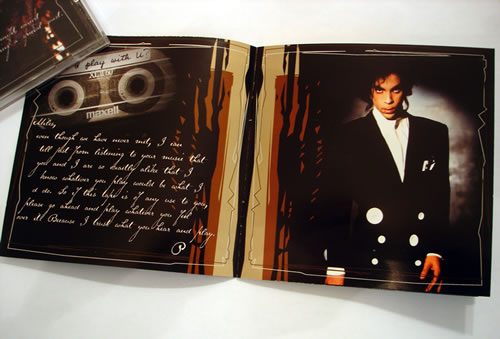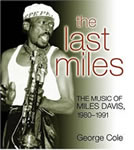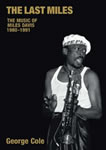Miles Davis once said that Prince could be the new Duke Ellington and during the 1980s, Miles was keen to work with Prince on recording music together. Sadly, little emerged from this musical partnership. In the second half of this exclusive interview, Eric Leeds, Prince’s saxophone player during much of the 1980s, talks about the relationship between Miles and Prince, covering projects such as the Prince/Miles track originally destined for the Tutu album, playing live on stage with Miles and Prince, and the Madhouse project, which yielded four tunes Miles was set to record for his last album, Doo-Bop. Eric also talks about what the music of Miles meant to him.
This is Part 2 of TheLastMiles.com interview with Eric. You can also read Part One.
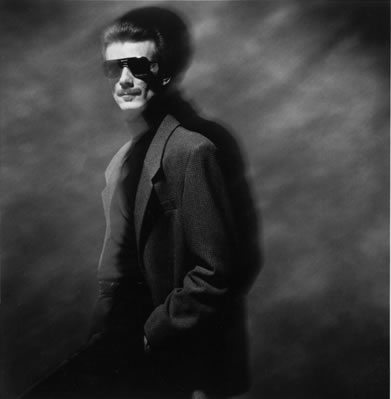
Eric Leeds – photo by Lee Stanford © and courtesy Eric Leeds
TheLastMiles.com: Your brother Alan [Alan Leeds was Prince’s road manager for many years] says that you and Wendy and Lisa helped make Prince more aware of the music of Miles.
Eric Leeds: Alan had already told me that there were a couple of Miles albums Prince would listen to regularly, Kind of Blue was one and I think Jack Johnson was another, and there may have been a couple of other things. And because of this, I just realised that there were a lot of interesting opportunities for [Miles to] get involved in Prince. I remember once seeing an interview with Miles around 84/85 were Miles mentioned Prince and said if he was interested in listening to anybody, he was the cat. So I made sure to bring that to Prince’s attention and he looked at me and smiled and said: “When Miles says something about you like that, I guess it makes it all worthwhile.” So I said: “Yes, just remember that!” It wasn’t like we had a lot of discussions, but I do remember once I gave Prince a set of all the [second great] Quintet albums as a Christmas present. Now, whether Prince ever got into those albums or not, I don’t really know, but I was just trying to turn him on to different things. I turned him on to [John Coltrane’s] A Love Supreme and I also turned him on to Duke Ellington at Newport – “Diminuendo in Blue,” which he fell in love with. I’m really not sure what Wendy and Lisa might have turned him onto, but they were always turning him onto stuff.
[The first time Miles and Prince worked on the same piece of music was “Can I Play With U?”, a track composed by Prince for Miles and originally destined for Miles’s first Warner Brothers album, Tutu]
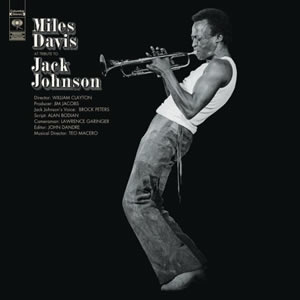
TLM: How did “Can I Play With U?” develop?
EL: I was on holiday at my parents in Florida and Alan called and said that Prince wanted me to do some recording the day after Christmas [1985]. I was a little pissed because I wanted to spend the whole of the holiday with my parents and Alan said “He’s only going to need you for like a couple of days and then you can fly back to Florida” – I ended up being there for about three weeks! We were in the studio almost every day. I had to fly home from Miami to Atlanta to get my horn and then go back to the airport and jump on a plane to LA. By the time I got to LA, I was fried and I knew I was probably going to be in the studio all night. I had a quick nap and then went to the studio – we used to work at Sunset Sound before Paisley Park [studios] was built. So the first thing that happens when I get there is that he has this track up and he said: “I’ve been talking to Miles.” I said: “Really?!” and he said “Yeah and I’ve got a track here that I want to send to him. Here it is, I’m going out to have dinner – do whatever you want with it.” I said: “Okay.” So I did what I did, and three, four hours later, Prince came back and listened to it and said “Yeah, that’s cool, I like it.” So I asked him “How are you going to get it to Miles?” and he said “Well, he’s in town, he’s in Malibu, why don’t we go to his house and give it to him?” and I said: “It sounds good to me!” So, he was on the phone to Miles the next day and then he said: “You know, I think we’ll just send it to him.”
That was basically the end of it. We were in the studio working on a lot of incidental music for the movie Under the Cherry Moon. Prince had started the editing process on the movie and he was in the final stages of sequencing what would have been the Parade album, and Wendy and Lisa and Sheila were around. This was a time when we were just going into the studio and jamming a lot. There was another song that we did after “Can I Play With U?” called “A Couple of Miles,” it was a really nice song. I don’t recall Prince ever saying it was something he was going to give to Miles or wanted Miles to hear, but he was just in a Miles Davis frame of mind and it was like a tribute to him. It’s a little dated now because of the sound of the drum machine but the song was a much hipper song than “Can I Play With U?” It had a hipper melody and had a nice little bridge that allowed me to do some interesting orchestrations with a multi-sax horn section.
TLM: “Can I Play With U?” was rejected by Prince and pulled from Miles’s upcoming album.
EL: I really didn’t have that much opinion of “Can I Play With U?”. I don’t really know what Prince’s views were, other than he was excited about sending it to Miles. It was two or three months later that Miles had put his trumpet on it and he got it back. Prince gave me a cassette of it, but I don’t remember Prince and me sitting and listening to it together. I played it a couple of times and other than the fact that “Oh my God. I’m hearing my saxophone and Miles’s trumpet on the same song,” the music really didn’t do that much for me. And of course years later after Miles had died, Warner Brothers wanted to use that song and Prince decided not to let them use it. I am in complete agreement with Prince on that because now I listen to it and I think Miles didn’t do anything on it that would do him justice. And the track really wasn’t that great – it was not a particularly good Prince track. I’ve never had any subsequent discussions with him about it, but the fact that he’s not going to let it be used, that’s his statement that the music wasn’t any good – ‘it doesn’t do Miles or me any justice and let’s let this one gather dust in the vaults’. And I’m in complete agreement on this. [Note: the only official release of this track is on the CD boxed set of CBC’s radio series on Miles, The Man With The Horn. Disc five contains a 45-second excerpt]. I always think that what could have happened with Miles and Prince is what could have happened with Miles and Jimi Hendrix [around 1969, Miles and Hendrix came close to recording together].
[“Can I Play With U?” has been posthumously released and is available on both physical discs and streaming formats such as YouTube.]
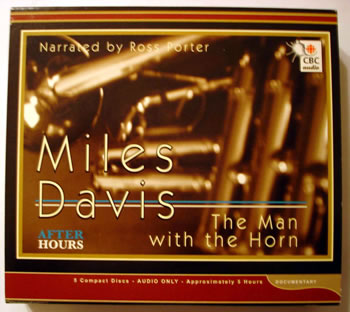
TLM: Prince always seemed reluctant to work with Miles in the studio.
EL: I remember a discussion I had with Prince and he said:” I don’t know exactly what to tell Miles what to do.” And I laughed and said: “That’s exactly what he wants you to do. You’re not going to tell him what notes to play but Miles want a new experience and you’re one of the few musicians that he’s actually willing to go into the studio and open up to: “Reach into me and try to get something out of me that I haven’t been able to do.” And I said to Prince: “What’s the worst thing that can happen – he walks out of the studio – so what!”
TLM: You were part of an amazing dinner party on March 24 1987 that included Miles, Prince, Prince’s Dad, Sheila E and you. Was that the first time you met Miles?
EL: He had come by a rehearsal for the Sign ‘O’ The Times tour that afternoon and I was introduced to him then. I had gone home after rehearsal and got a call from one of Prince’s assistants, “By the way, Prince is inviting you to have dinner with him,” so I jumped in my car and went over to Prince’s house. I kinda think that Prince wanted me there to open up the conversation with Miles and get things rolling. Miles was as much a performer during that dinner as he ever was on stage. You couldn’t get him to shut up and it was very funny! There are some aspects of that evening that I’m not sure I want anybody else to know about, and if I do, it’s going to be in my book! [note that at present, Eric has no firm plans to write a book].
But basically the most interesting aspect of the relationship between Prince and Miles was the dance that they would do around each other. What Prince really related to about Miles was his character – his legacy, his mystique and everything that Miles represented as a personality. Prince saw in Miles so much of what he thought of himself – the person that goes against the grain, that’s opinionated, that doesn’t allow himself to be controlled by any aspect of the industry for his own artistic vision. And that’s very much what Miles saw in Prince. He saw a young version of himself but there was always something about the generational thing. It was like “The King is dead, long live the King.” You had these supreme egos that had an undying respect for each other but neither wanted to give it up to each other. So with Miles, you could almost see the cartoon balloon over his head saying: “Yeah you’re young and hip, but I’ve got all of these years of experience that you haven’t had yet.” While Prince was looking at Miles and saying “Yeah, you’re the icon – but you’re old! I’m the new version!” And it defined and characterised every aspect of their relationship and it was hilarious to sit back and watch that unfold. That was the biggest enjoyment for me – watching these two dance around each other.
TLM: Any more recollections you want to share?
EL: At one point in the evening, Miles grabbed me by the arm and said: “Eric, let me see your carriage!” I’m looking at him and trying to be cool and I say: “My what?!!” And he says, “Your carriage! Show me how you hold your horn!” And then I realised: “Oh my God, he’s using an archaic definition of the word carriage. He said “Show me how you stand when you hold your saxophone.” Then he goes: “Do you do it like this?” And he mimicked the way a saxophone player holds his horn. I looked at him and laughed and then I said, “Is that the way I should hold it?” And he said “Yes,” and I replied, “Well Miles, that’s exactly how I hold it!”
When we were sitting down the first thing I wanted to ask him was about the acid funk band with [guitarist] Pete Cosey [1973-1975], which is the band that I absolutely loved. I was one of the few people at the time that did! And Miles looked at me and said “You liked that band? Nobody liked that band! I never met anybody who liked the band. You liked that band?” I said “Miles, there were some of us who loved that band.” I also got the indication from his demeanour that that was a period of his life he didn’t remember too much about and what he did remember, he didn’t want to remember. I don’t think a lot of people realised that a lot of what Miles said, he said for effect. That he really wanted to say dumb stuff at times just to see how you would react or it was his way of making of point. So it was a case of trying to figure whether he was saying something for effect, or was heartfelt or was a direct response to a comment.
I remember asking him “Are you into someone like [trumpeter] Lester Bowie? A part of me said “Lester Bowie comes from the Art Ensemble of Chicago, a kind of music Miles was known for disliking, so what will he say?” Miles changed his tone of voice and looked at me very seriously and said: “Why wouldn’t I like Lester Bowie?” But then it would not have surprised me if I saw an interview with him in a magazine the next week where he dissed Lester Bowie! Because he was going to say what he was going to say depending on how he felt or what he felt the purpose of the question was. It was an interesting night.
TLM: On New Year’s Eve 1987, you finally got to play on the same stage as Miles, during a Prince benefit event at Paisley Park studios.
EL: I always regret one moment. There was just one moment when I wanted to nudge the trumpet player Matt [Blistan, aka Atlanta Bliss] to go into a melody line in “Agharta” and the moment came and went by so quickly that I wasn’t able to grab it. I always regretted that because I really wanted to see the look on Miles’s face! The whole affair lasted for all of five minutes but it was cool.
TLM: Wasn’t Prince perplexed because the band was forgetting all the cues?
EL: He gave us one of his hand cues to hit a riff and as I remember it, no one hit the cue, because they were all grooving on what Miles was doing and Prince was kinda taken aback! He yelled “Hey, I’m still the boss up here!”
TLM: I was saying to Alan that it was strange that the concert was never released, although there is a bootleg audio and Video CD, Miles From The Park.
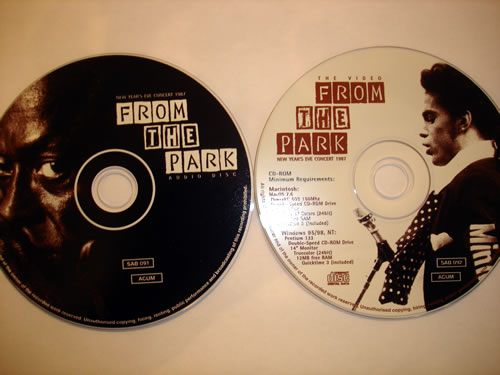
Miles From The Park
EL: The anticipation was a lot stronger than the actual event. It was a very fast funk groove that we were doing and it wasn’t anything that Miles was going to do anything other than just basically do his stick.
[Since this interview, the 1987 News Year’s Eve Concert has been officially released on DVD on the posthumous Prince release Sign O’ The Times (Super Deluxe) boxed set.]
TLM: Miles appears on Prince’s song “Sticky Wicked”, along with Prince Chaka Khan. But I gather the song wasn’t written with Miles in mind.
EL: When Prince had the track up and Matt Blistan and I did the horn parts I can’t recall Prince making any mention about Miles, although he did say he’d written it for Chaka. Interestingly enough, the title “Sticky Wicked” had been applied to a different song, which was actually the title song of my first album Times Squared. I heard the track and asked Prince if I could work on it for my album and he said yes. And then a couple of weeks later, we were working on this track for Chaka and I asked what the name of it was and he said “Sticky Wicked!” Later on when we were on the road he said “Listen to this.” It was the finished track and Miles was on it. That was the song that got me officially into the Miles Davis discography! It was a much better track and much better utilisation of his horn than on “Can I Play With U?” It was a cool little song.
TLM: There’s a lot of controversy surrounding whether Miles and Prince ever worked together in the studio. In one interview Prince has suggested that they recorded together, but Alan is convinced that they never did.
EL: I have to agree with Alan on that. I don’t know what Prince was thinking or whether it was something that Prince said that was taken out of context. But I find it almost impossible to figure out how that could have happened, because Alan was still around running the record company and I was still around, although not a member of Prince’s band, I was working on my own albums at the time. Unless it was somewhere on the road that Prince and Miles met in the studio, but anything they would have done, Alan would have heard and I probably would have heard it too. It would have had to have gone through Alan’s desk. I know of no one else who has made mention of it. So I don’t know what Prince was talking about [TLM note: if Prince or anyone from his organisation would like to clear this up, we’d happily report your comments on this website!].
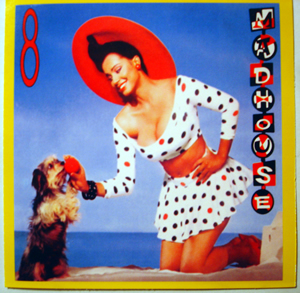
TLM: Madhouse was a very interesting project. How did that come about?
EL: He called me one Sunday afternoon after the Parade tour and said “Do you want to come over to my house and play some jazz?” I go over to his house and he’s already got three or four tracks done. I had no understanding what this was specifically going to be because a lot of times we’d go into the studio together and do different things that would never see the light of day. I think the entire process of the Madhouse album was done in about three days and it was only when we got about halfway through it that he explained what he was going to do. It was kind of a double-edged sword for me, because it was obviously a project he was putting together to feature me; that I was going to be the ostensible prime attraction, which was great because of the visibility that it would give me.
But to be absolutely honest with you, I was never that crazy about that album, the first one particularly – the music was not that interesting. Once again, it was a very interesting and enjoyable project because the process and the manner in trying to do what he was trying to do and the way he got things out of me. But at the end of the day, it wasn’t stuff that I was particularly interested in listening to. There were some interesting parts. On the first album, Prince wrote all the songs and played all the instruments except saxophone – it was entirely his project. It was a wonderful opportunity, but the way it was marketed, [meant] a lot of people are under the impression that it was my music and it was much more of representation of what I am as a musician and it’s just not so – it was one hundred percent a Prince project and I was just playing the role of a saxophone player.
TLM: Prince went to great pains to hide the fact that it was a Prince record.
EL: This is what he came up with and I didn’t necessarily disagree with him on this point. He said “I’m not going to go so far as to say that this is jazz. This album will never get anywhere because the critics are going to blast it. They’re going to say ‘how dare this guy think he can make a jazz album.’ And if it comes out, I don’t want it to just end up with all of the Prince fanatics. I want to distance myself from this and see if we can get some form of an honest reaction without any preconceived notions as to my involvement with it.” So what it ended up with was all of these fictitious names [of band members and recording studio] that he came up with and then the whole marketing project became silly, because I was the only person that was going to have a real face. And the whole marketing ploy was based on me going out and lying to everybody about what it was about. After a while, it really became silly and to this day, Prince is aggravated over the fact that people found out that it was really his album.
TLM: Is that so?
Oh yes. I finally said: “Prince, give it a rest. Everybody whoever interviewed me about it was like “Oh yeah, I’m supposed to really believe that this isn’t Prince?” I would try to convince them but I don’t think I was fooling anybody. It became like an inside joke, like the fact that it was supposed to have been recorded in Pittsburgh, where I came from. And the fact that I lived in Atlanta and everybody in the “band” was supposed to be part time musicians who I knew from Atlanta. We came up with name, occupations – we put a whole back story to everything about the album – it was very funny. I realised that we had had created a monster when he had given the back story to his publicist and his publicist called me to put together the initial press release and in discussing it with the publicist, I realised that the publicist didn’t realise that it was all a lie! Prince had not let the publicist in on it! I said that’s perfect Prince, because if the publicist is going to make this work, he has to believe it. Regardless, it was very successful and the idea not to give the songs any names, just numbers was his, which was cute. And we had a top ten single (“Six”) out of it.
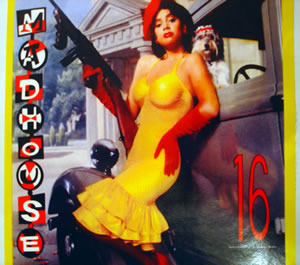
TLM: You did a second Madhouse album, 16.
EL: I really liked it except for two songs [Eric would rather not say what they are!]. That was a much more organic album. That came up from spontaneous sessions with Prince, myself, Sheila E and Prince’s bass player at the time, Levi Seacer. The four of us went into the studio over two or three days and just played and everything on the second Madhouse album came from those sessions. In fact, several songs that were one my first album (Times Squared) came from those sessions – “Andorra,” “Night Owl” “Overnight, Everynight, “ and “Kenya”. I made songs out of them with a whole lot of post-production work and a lot of chopping and editing and a lot of studio whizz-bang, but the basic tracks came from those sessions. 16 was more of straight-up, funk, R ‘n’ B album. I just thought that the music was better realised; it was more cohesive album. Unfortunately it wasn’t that successful.
TLM: Why was the planned 24 album such a troubled project?
EL: Prince did all the tracks himself and I think he started doing some of them when we were on the road doing the Lovesexy tour. When we were in Europe on the road in 1988 and there were a few off days, Prince would always go to London and work in the studio and I think some of the tracks came from those sessions. He called me into the studio after we got off the road – around December 1988 – and he had all the tracks done. I think I did all the horn parts in two days and he was with me for all the sessions. So we did the album and he did the mix on it and gave me a copy. I don’t recall what timetable he had in mind, but at that time, the relationship he had with Warners had started to turn [deteriorate] and things like Madhouse were hardly a priority for Warner Brothers. I think they were desperately trying to get Paisley Park records going as a viable label. If Prince had really wanted it released, it would have gotten released.
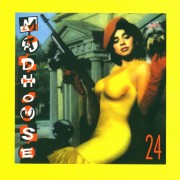
Several months went by and I never heard anything about it – Prince and I never had any conversations about it. And by spring of 1989 I asked Alan what was happening with the Madhouse album. Alan didn’t know what was happening, so I asked Alan to ask Prince about it. Prince’s answer was a little obtuse and that led me to believe that he was starting to lose a little interest in it. I wasn’t that crazy about that album. Once again, there were parts of it I liked, but as a whole it wasn’t something that held up for me. I also objected to the mix on some of the songs. Alan came back to me and said that Prince wanted to know what I thought of the album. I said that “Tell Prince that I’m not one hundred percent satisfied with the mix and if it’s okay with him, maybe he’d give me the opportunity to take a couple of songs and go into the studio and remix them.” I was a little surprised that Prince gave the go-ahead to that. Between the time I was going to book the studio to go in, Alan said: “Prince has changed his mind. He says ‘forget it.” He wants to start over.’” By now it was summer time and Prince was working on the Batman album [Batman Returns soundtrack] and he had to hurry up and finish – he was in overdrive getting that done. But he wanted to get started on the next Madhouse album.
So basically he had gone into the vault and made four cassette mixes on about three dozen pieces of stuff. And he gave them to me and said “spend a couple of weeks on this and if there’s anything you hear that could be the basis of the next Madhouse album, go into the studio and start to have fun. Do whatever you want to do with this stuff.” And I’m thinking, “he’s just given me the keys to his vault.” There was a lot of stuff that was a bunch of crap but some stuff was cool. So I started working on that and as the summer progressed, I expected him to walk in the door and say: “Let me hear what you’ve done and let’s start to focus on this.” But as time went by, I started to realise that he was letting me have this one on my own.
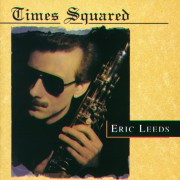
And all of the time, I was under the impression that this was going to be the next Madhouse album. One of the things I did do was take the long piece from the original 24 album called “The Dopamine Rush Suite” which was about 25 minutes long and I edited the hell out of it and made a seven-minute piece out of by taking out all the stuff I didn’t like. That ended up on the [solo] album. Basically I came up with my solo album. I made rough mixes and gave them to Prince and he said “I really like what you’ve done, but it doesn’t sound like Madhouse.” I said “How is it going to sound like Madhouse – Madhouse is you much more than me.” So I said: “What do you want to do?” And he said “I’m going to sign you to Paisley Park and it’s going to be your record.” I was hardly going to argue with that! But Times Squared wasn’t a hundred percent Eric Leeds album – it was a lot of my sensibilities and something that began as something else. It was a very interesting project and I was very grateful for the opportunity. I was very intrigued that he would allow me take what was ostensibly his music and take it into a completely different space. But it wasn’t until my second Paisley album Things Left Unsaid that the music was entirely mine.
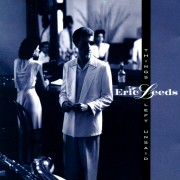
TLM: But there were other attempts to record a third Madhouse album?
EL: Prince, me and a couple of other members of his band subsequently went into the studio. I’ve got two more Madhouse albums that were recorded in ’93 and as late as ’95 – stuff that never came out. By then his relationship with Warner was pretty much done and his interest in releasing music like that had pretty much disappeared. There were about three completely different versions of what would have been the third Madhouse album.
TLM: Where did the concept come for the intriguing album covers of a girl and a puppy?
EL: His own whack sense of humour. The fact that it was so completely off-the-wall, plus that was a girl [Maneca Lightner] he was with at the time!
TLM: Prince sent four of the original 24 tracks – “17 (Penetration),” “18 (RU Legal yet?”), 19 (“A Girl and Her Puppy),” and “20 (Jailbait)” to Miles for inclusion on his what would have been the album Doo-Bop.
EL: There was a song released later called “17” under the Madhouse name which was a completely different song. It was released on a sampler called New Power Generation. A lot of people got the mistaken impression that Miles had something to do with that Madhouse album and he didn’t. But Miles did play the songs live and go into a studio and record his own versions of them with his own band.
TLM: You also recorded some music for Miles that might have appeared on the album that became Doo-Bop.
EL: I did two songs for Miles in late 1990/early 1991 under Prince’s direction.
Miles and Prince would talk on the phone quite a bit. Miles was really interested in getting Prince to do something with him, but I don’t think by then, Prince was really interested in doing some tracks and giving them to Miles. I have a feeling that by then, Prince had lost a little interest in what Miles was doing and maybe at that point, he thought that what he wanted to get out of Miles, Miles wouldn’t have been able to realise. It might have been the sense that: “You know, I don’t want to get into a situation that might be embarrassing.” This all speculation because he never said anything like that to me, but knowing Prince I’ve always wondered if that might have had anything to do with it.
Prince looks at me and says: “Why don’t do you some tracks for him?” So I said: “He’s not asking me – he’s asking you!” And Prince says “Yeah, but I want to give him something”. “So I said “What do you want me to do?” and Prince said “Just go in the studio and have some fun and do something and send it to him. I’ll check it out first.” It was like “Maybe you can come up with something that I can then do some stuff with.” He left it open like that. Somehow it had been intimated that Miles was interested in Prince’s song “Nothing Compares 2 U,” so Alan suggested I do a track on that, so I did and a little thing of mine I called “Frame of Mind.”
TLM: Was your new version of “Nothing Compares 2 U?” different from the original?
EL: I changed it up a little bit. The textures were a little bit different.
TLM: Tell us about “Frame Of Mind.”
EL: “Frame Of Mind” was a song I did with my band back in Pittsburgh, which was based on a little guitar riff from side four of the Agharta album. About a third of the way into the side, they get into a momentary groove and [guitarist] Reggie Lucas is playing a kind of Curtis Mayfield-ish guitar riff that’s based on an E Minor 7th chord. I had put a bass line and a melody line to that riff. So I said: “Let me do this and maybe Miles will get a chuckle out of it if he recalls the riff.” And that track came out okay, but neither of them is Earth-shattering. I did them with drum machines and played all the keyboards. At the same time, George Clinton was in Paisley [Park] working on stuff and [P. Funk guitarist] Garry Shider was around and I thought “I’d really like some guitar on this and I’ve got one of the great funk guitarists in the other studio!” So I asked Garry to play a little riff which I showed him on piano and he put the guitar on it. So the tracks got sent to Miles but I have no idea whether Miles ever listened to them.
TLM: Did Prince play on any of them?
EL: No, but I can only assume that he heard them before they went off to Miles.
TLM: You left Prince’s band and later returned.
EL: I was out with him on the road for a brief period in 2002 on the end of the One Night Alone tour. I came in on the end of it – a couple of weeks in Europe and a couple of weeks in Japan. We were working together for a while in the studio in 2003 and I haven’t seen or spoken to him since.
TLM: What’s your take on the music Miles did in the 1980s?
EL: I can give you my subjective comments and my objective opinion and it’s up to anyone to draw the fine line between them. First of all, in order understand where I’m coming from about his music in the 1980s, I have to set it up. When Miles went into his seclusion in 1976, he basically made a statement that he no longer knew what to do with music, that he was no longer listening to music that interested him any longer, so he was going to bow out until he found something that was worth his while. And you can’t dismiss the fact that he was a very sick person at that point. If he had been completely healthy, I don’t think his opinion about music would have changed. The fact that there was nothing that was challenging him in music combined with the fact that he was very ill and went into seclusion was all part of it. This was a guy who up until that point had been obsessed with being relevant and finding something new to him.
I remember things that [keyboardist] Keith Jarrett would say about Miles: “Miles is so obsessed about doing something fresh and new that he would rather have a lousy band doing something new than a good band doing something that he had done before.” And he’d also said to Keith one might after the gig: “I don’t play ballads anymore, because I love playing ballads.” He was not going to allow himself a comfort zone and it was a hallmark of everything that Miles was about as a musician. I remember when all the hardcore fans who had even liked Bitches Brew had it when he went into the guitar-orientated acid funk. I basically thought: “If you don’t like electric guitars or the textures or whatever, that’s fine. But for what this band is doing, this band is incredible. You know Miles doesn’t want a jazz band -he’s going to do what he does. And the spontaneity and the ethic of the process of how he comes to realise his music is absolutely the same as for anything else he did in music. But he’s working with a different musical vocabulary and a different musical texture and a different musical sensibility and that’s what he wants. It doesn’t interest him to play jazz. He wanted a funk band and he went out and put together a great funk band and there was never a band like that before, then or since!
During those Howard Hughes years, Miles was basically living a life of drug addiction and sexual debauchery. You have to realise that this was a guy who had been to hell and back. He was probably as close to death as we’ll ever know. And through his friends, and particularly Cicely Tyson, he finally came out of that realising that he wanted to be alive. He never went through a twelve-step programme; music was his AA [Alcoholics Anonymous]. He also wanted to maintain a lifestyle he was used to and basically he had one option – to play music again.
By then, Miles was finally defined. The unique thing about Miles, more so than any other artist that I can think of, is that it took longer to define his creative art than anybody else I have known, because he was so involved with so many things, from the period of time he went to New York [in 1944] chasing Charlie Parker to his period of seclusion in 1976. He was either the primary innovator or on the cutting edge or the best example of every evolution in progressive music and you can’t say that about anybody else. You can speculate about what [saxophonists] Charlie Parker or John Coltrane might have done had they lived, but they didn’t and Miles did.
My opinion is that the entire vocabulary of progressive music, jazz and also pop music had been defined by 1980. There was nothing more to do by anyone. All you could be was an exceptionally unique stylist or an exceptional musician like Prince, who was able to make great music. But I don’t consider Prince to be an innovator. Stylistically he was, but the nuts and bolts of music, harmony, rhythm and melody – the vocabulary was done. I feel the same way about Miles. Anything that anybody could say about what Miles had contributed to his musical legacy as a trumpeter, as a composer, as a bandleader, as a conceptualist, could have been said about him in 1976. If Miles had never played another note after that, everything written about him could have been the same. There’s nothing that he did after he came out of seclusion that really changes the legacy of his contribution to music. I’m not saying that as an insult but as a comment on the fact that when Miles came back, the vocabulary was done and that not even Miles could add anything new.
I’m not one of these people who says that Miles sold out or that he dumbed down. The integrity and the honesty that Miles brought into his music of the eighties was every bit the same as anything else that he did. But Miles had changed. And from a human point of view, probably for the better in terms of his own life. What was the main thing that people used to comment on when he came back? It was that he was acknowledging the audience and I think he was very touched that people were so happy that he was back again and playing music. It was like “If there’s nothing new for me to do, I’m going to just do what I feel like doing.” And he wanted to remain contemporary, so he wasn’t going to back and play “My Funny Valentine” again. He was going to play music that was relevant to the time he lived in.
That’s the objective way of looking at it. Subjectively, I’ve got to be honest with you – I hardly listen to anything he did in that period. When he came back, the first couple of albums [The Man With The Horn, We Want Miles] I listened to a lot because I was happy to have him back. But I realised that his sound as a trumpet player was never going to be the same. It’s impossible as a trumpet player not to play the horn for the period of time he didn’t and to pick it up and regain the same kind of tone. I was glad that the sound was at least what it was. The only objection I have from a personal standpoint is that the textures of his band, particularly in the late eighties, sounded very generic. But that was a function more of the synthesisers that by then had become very generic. In the early days of synthesisers you had to know how to create a sound, but the late eighties, they were all pre-programmed with hundreds of different sounds and textures and everybody was just basically hitting the same pre-set. It must admit that much of the material I recorded then kinda dates itself because of the particular textures that happened to be the flavour of the week.
And I just wasn’t interested in him playing songs like “Human Nature” or the pop songs he was covering. And to the extent that the bands and the music didn’t interest me, that’s not a function of the musicians, as much as a function of Miles, because Miles as a bandleader had the ability to realise anything that he wanted. He made a lot of music during the eighties that touched a lot of people and on any given night you had the opportunity to hear Miles play a solo that would transport you to a special place. But most of the music that he played during the eighties didn’t interest me that much. A lot of people got a lot out his music and I don’t begrudge them that. It was more about me than Miles because Miles didn’t owe me or anyone else anything. He truly enjoyed it and was into it and that speaks for itself.
I also think that Miles knew during the last years of his life that he hardly had the facility as a trumpet player to play the kind of music that hit the kind of harmonic or other challenges that he might have been doing previously. I think he was relishing the role of elder statesmen that he had now gravitated to and I think he wore it well.
The Miles that I knew isn’t the Miles that I think of. If anybody had told me in the 1970s that I was going to meet Miles the whole idea would have been frightening to me. And when I finally did meet Miles in the mid-80s, it was a different persona. From a standpoint of getting to know him the little I did, it was a lot better, because I would not have had the opportunity to have engaged in conversation, The fact that the last time that I saw Miles he came up behind me and threw a bear hug behind me – if anyone had ever told me that would ever happened, I would have said: “You’re out of your mind.” But the hero musician to me was not the Miles that I knew and I like that fact.
Miles is like all of these heroes of mine – James Brown or Prince or [keyboardist] Joe Zawinul. The guys that you put on a musical pedestal all share a tremendous sense of insecurity, which is very much a part of what drives them as musicians. And you saw it in so many aspects of Miles’s life. It probably comes with the territory that if you’re going to be a genius, you’re going to be dysfunctional. That Miles was able to be a survivor and truly enjoy the last years of his life; that was just an important as anything he might or might not have done during the last ten years.
Many thanks to Eric and to Alan Leeds. Thanks also to Dawnation for the 24 image and to Dawnation and Housequake.com for linking to this piece. Dawnation has an excellent section on the evolution of Madhouse.
